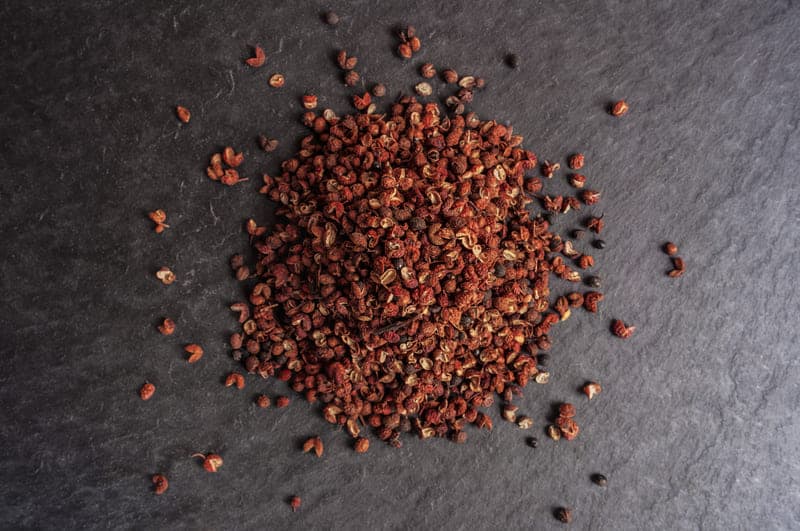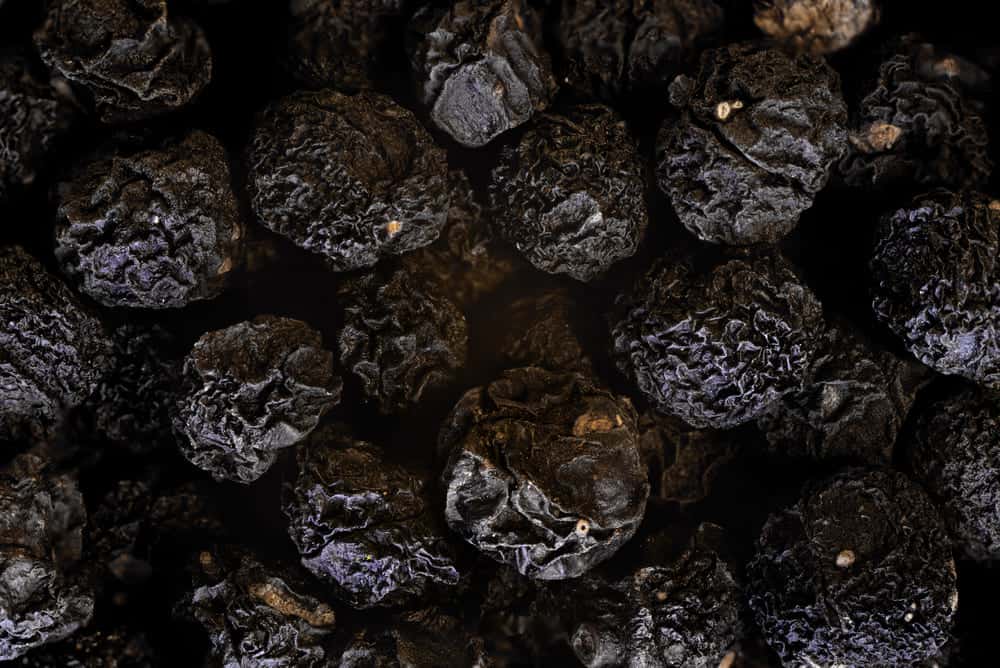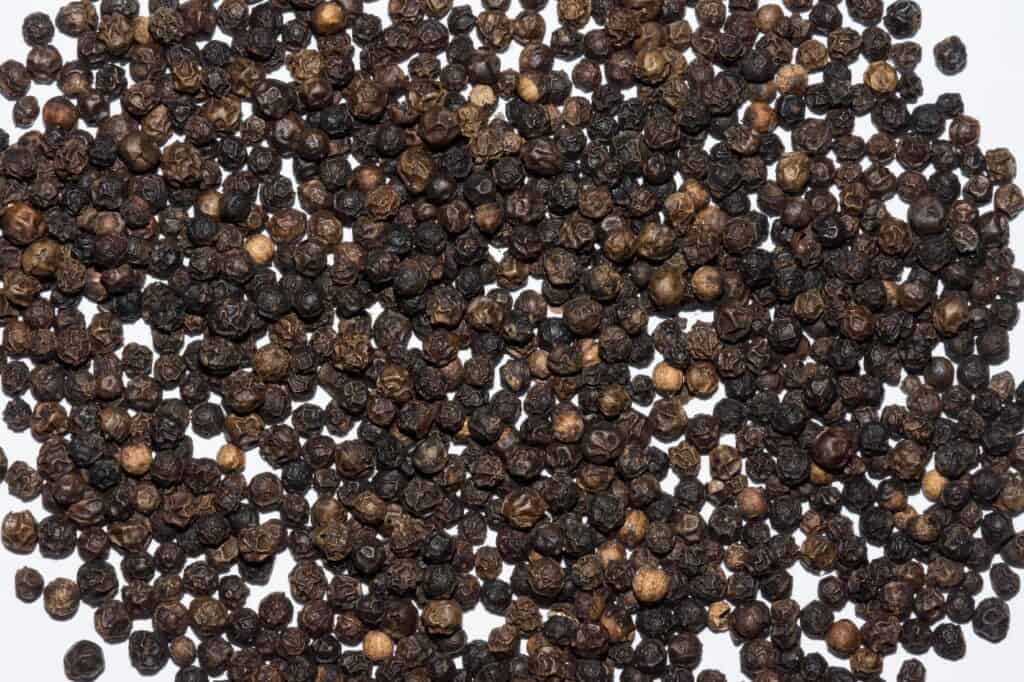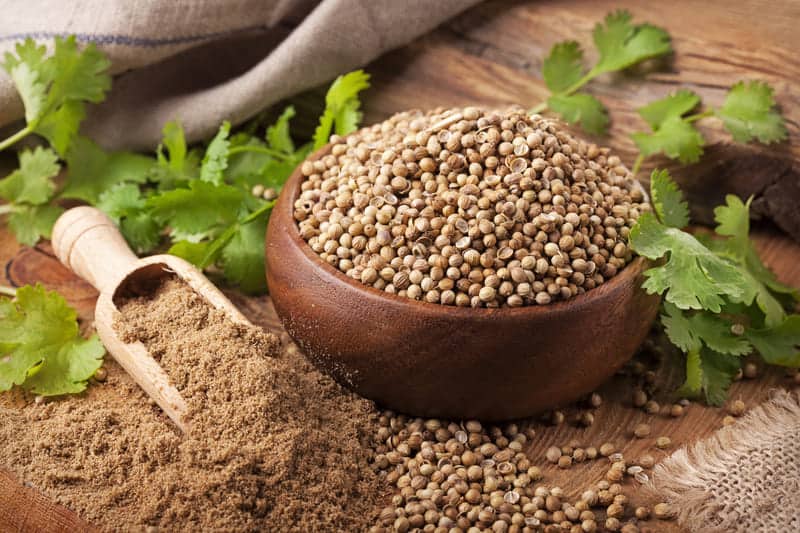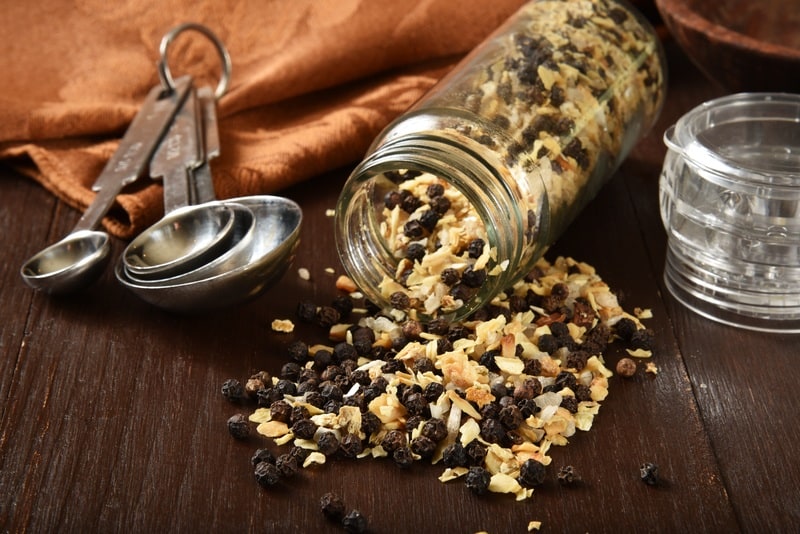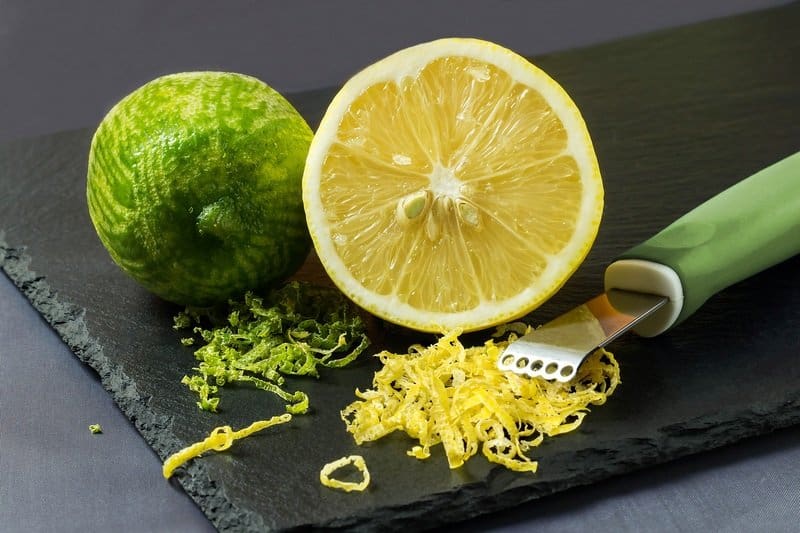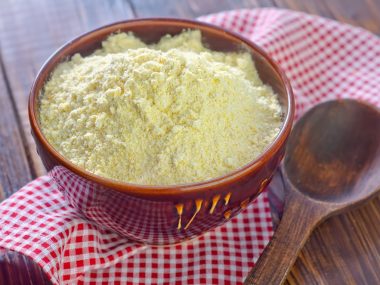Sichuan peppercorns are aromatic spices with a unique flavor that originated from the Chinese province Sichuan. It comes from the dried pods of seeds from the spiny shrub. And is a common ingredient in many different traditional dishes of the Sichuan and Chinese cuisines.
You can choose between red and green Sichuan peppercorns. They are both harvested from a different type of spiny shrub and have a different flavor. Green Sichuan peppercorns have a stronger citrusy-herbal flavor, while the red ones have a pine-like flavor.
However, they both will leave a numbing sensation in your mouth like when you are drinking a carbonated drink. You can find Sichuan peppercorns ground or whole in Asian stores.
Sichuan peppercorns are used in many meat dishes, noodle dishes, seafood, vegetables, stir-fries, and as an ingredient in Chinese five-spice powder, Sichuan peppercorn oil, and Sichuan peppercorn salt.
If your recipe calls for Sichuan peppercorns but you don’t have an Asian store near you, you can use some other spices as a substitute for this unique spice.
Good substitutes for Sichuan peppercorns include Tasmanian pepper, Grains of paradise, Tellicherry peppercorns, black pepper and coriander seeds, or some of the next products.
Let’s learn more about these substitutes and find the right one for your next recipe!
Best Sichuan Peppercorns Substitutes
It is hard to find spices that will have the same flavor as the Sichuan peppercorns. However, you can try the following spices to mimic the flavor of Sichuan peppercorns in your recipes.
1. Tasmanian pepper
Tasmanian pepper is a spice made of berries from a shrub that grows in Australia. They have black color and sweet-fruity, spicy flavor similar to the flavor of the fennel and juniper.
Tasmanian pepper works well in curries, stews, soups, sauces, salad dressings, marinades, alcoholic beverages, and cheese.
They will not give your dish the same flavor as Sichuan peppercorns but you will get a nice spicy, woody, and fruity flavor.
You can substitute Sichuan peppercorns with Tasmanian pepper in a 1:1 ratio.
2. Grains of paradise
Grains of paradise are small red-brown seeds from a plant native to West Africa with a specific herbal, spicy, citrusy, woody, and cooling flavor that will linger in your mouth like a tender flame.
Grains of paradise works well with other herbs like rosemary, thyme, and sage which will enhance its flavor if used together. You can add grains of paradise in salad dressings, sauces, curries, seafood, and roasted vegetables.
You can use grains of paradise in your dishes as a substitute for Sichuan peppercorns in a 2:1 ratio.
3. Tellicherry peppercorns
These peppercorns are one of the most known peppercorns grown in Tellicherry, a city in India. They are black and bigger than regular peppercorns.
With a complex flavor that can be explained as fresh, bright, sweet, fruity, and grassy with hints of pine and citrus. Tellicherry peppercorns work well in many sauces, meats, seafood, vegetables, soups, and stews.
Substitute Sichuan peppercorns with Tellicherry peppercorns in a 1:1 ratio.
4. Black pepper and coriander seeds
Black pepper and coriander seeds are also some of the spices that can give a small part of the flavor that Sichuan pepper gives to the dishes.
You will get a pine and citrus flavor that will lighten up your dish and give it a spicy note. However, you will not feel the numbing sensation that the Sichuan peppercorns are known for.
5. Lemon pepper seasoning
Lemon peppery seasoning consists of cracked black pepper and lemon zest in granules. However, it can also have added other ingredients like garlic powder, onion powder, salt, sugar, cayenne pepper, celery seeds, and citric acid.
You can buy this seasoning or make it at home, and add the ingredients you like.
Lemon pepper seasoning will give a nice citrusy and spicy flavor to many different dishes such as roasted vegetables, seafood, poultry, steaks, pasta, soups, sauces, marinades, dressings, and salads.
Substitute Sichuan peppercorns with lemon pepper seasoning in a 1:1 ratio.
6. Sansho powder
Sansho powder is a spice with green-brown color made from ground berries of Japanese pepper bush. It has a tangy, spicy flavor with a citrus hint and will leave a numbing sensation in your mouth just like Sichuan peppercorns.
You can use Sansho powder in different dishes such as soups, stir-fries, vegetables, marinades, Japanese noodle dishes, sushi, grilled meats, and grilled fish.
This powder is also an ingredient in the seven-spice mixture. You can use this powder in a 1:1 ratio as a substitute for Sichuan peppercorn.
7. Ground black pepper, ground coriander seeds, and lemon zest
If your recipe calls for Sichuan peppercorns but you only have black pepper, coriander seeds, and lemons, you can use them to improve the flavor of your dish.
Just mix the ground black pepper and the ground coriander seeds and add some lemon zest. You can use this spice mixture in dishes as a substitute for Sichuan peppercorns in a 1:1 ratio.
8. Sichuan peppercorn oil
Sichuan peppercorn oil is another great substitute for Sichuan peppercorns. You can either buy it in the Chinese grocery stores or make it at home if you have Sichuan peppercorns and canola or peanut oil.
This oil is a good addition to stews, sauces, stir-fries, dressings, grilled vegetables, grilled meats, and seafood. First, use a few drops and add more if needed.
9. Sichuan peppercorn salt
You can use Sichuan peppercorn salt as a spicy alternative to the regular salt you are using in recipes.
You can either buy it or make it at home with 4 tablespoons of the sea or kosher salt and 2 tablespoons of Sichuan peppercorns. Or you can adjust the ratio to your taste.
It is a very flavorful seasoning for various soups, stews, risotto, steak, vegetables, poultry, salads, seafood, noodles, and many other dishes.
If you are using Sichuan peppercorn salt as a substitute for Sichuan peppercorns reduce the amount of the regular salt in your dish.
10. Japanese seven-spice seasoning
Japanese seven-spice seasoning or Shichimi togarashi is made with Sichuan or sansho peppercorns, black sesame seeds, ground ginger, white sesame seeds, red chili peppers, dried orange peel, and seaweed (nori).
There are also other variations of these seasonings that consist of different ingredients. You can add this seasoning to soups, marinades, salad dressings, vegetables, grilled meats, noodles, rice, seafood, and poultry.
Use it in a 1:1 ratio as a substitute for Sichuan peppercorns.
Related Questions
Are Sichuan and Szechuan the same?
They are the same, just pronounced differently.
Sichuan is a Chinese province whose old name was Szechuan before the Chinese postal romanization when Chinese places got new transliterated names.
Sichuan cuisine is one of the most known Chinese cuisines, originated from Sichuan province.
Are pink peppercorns the same as Sichuan?
Pink peppercorns are not the same as Sichuan peppercorns. They came from a plant native to South America known as baie rose or pink berry. Pink peppercorns are dried berries that have a floral, slightly sweet, peppery flavor similar but stronger than the flavor of the juniper berries.
You can use them in many salad dressings, sauces, seafood, poultry, and as an ingredient in peppercorn mixtures.
Sichuan peppercorns, on the other hand, is a Chinese spice with a spicy, citrusy flavor, leaving numbing sensation in your mouth. You can use it in different meat dishes, vegetables, noodle dishes, stir-fries, and as an ingredient in Japanese seven-spice seasoning.
Final Thoughts
Sichuan peppercorns are a must-have spice in your kitchen because it gives a wonderful flavor to the food. But in case you don’t have it you can use some of these spices as its substitute.
Some of them will give a very similar flavor to the flavor of the Sichuan peppercorns, while the other will give just a small hint of its flavor. Anyway, your dish will have a better flavor and taste different.
